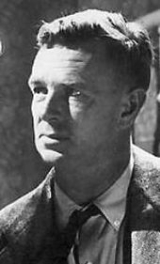
actor and author. For most of his career as a leading man
, he specialized in westerns
and film noir
, such as Johnny Guitar
, The Asphalt Jungle
and The Killing. Later on he became noted as a character actor for such roles as Gen. Jack D. Ripper in Dr. Strangelove or: How I Learned to Stop Worrying and Love the Bomb
(1964). He also played the Irish policeman, Captain McCluskey, in Francis Ford Coppola
's The Godfather
in 1972, and the novelist Roger Wade in 1973's The Long Goodbye
. At six feet five inches (196 cm), he was taller than most actors.
He was born in Upper Montclair, New Jersey
, to George and Frances Walter, who named him Sterling Relyea Walter.
"I’ve always wanted to sail to the South Seas, but I can’t afford it." What these men can’t afford is not to go. They are enmeshed in the cancerous discipline of "security." And in the worship of security we fling our lives beneath the wheels of routine — and before we know it our lives are gone.
![]()
What does a man need - really need? A few pounds of food each day, heat and shelter, six feet to lie down in - and some form of working activity that will yield a sense of accomplishment. That's all - in the material sense, and we know it. But we are brainwashed by our economic system until we end up in a tomb beneath a pyramid of time payments, mortgages, preposterous gadgetry, playthings that divert our attention for the sheer idiocy of the charade.
![]()
The years thunder by, The dreams of youth grow dim where they lie caked in dust on the shelves of patience. Before we know it, the tomb is sealed.
![]()
Where, then, lies the answer? In choice. Which shall it be: bankruptcy of purse or bankruptcy of life?
![]()

